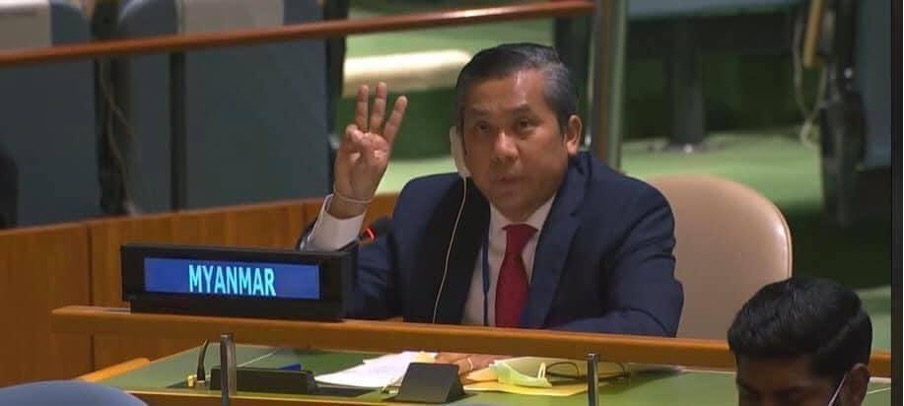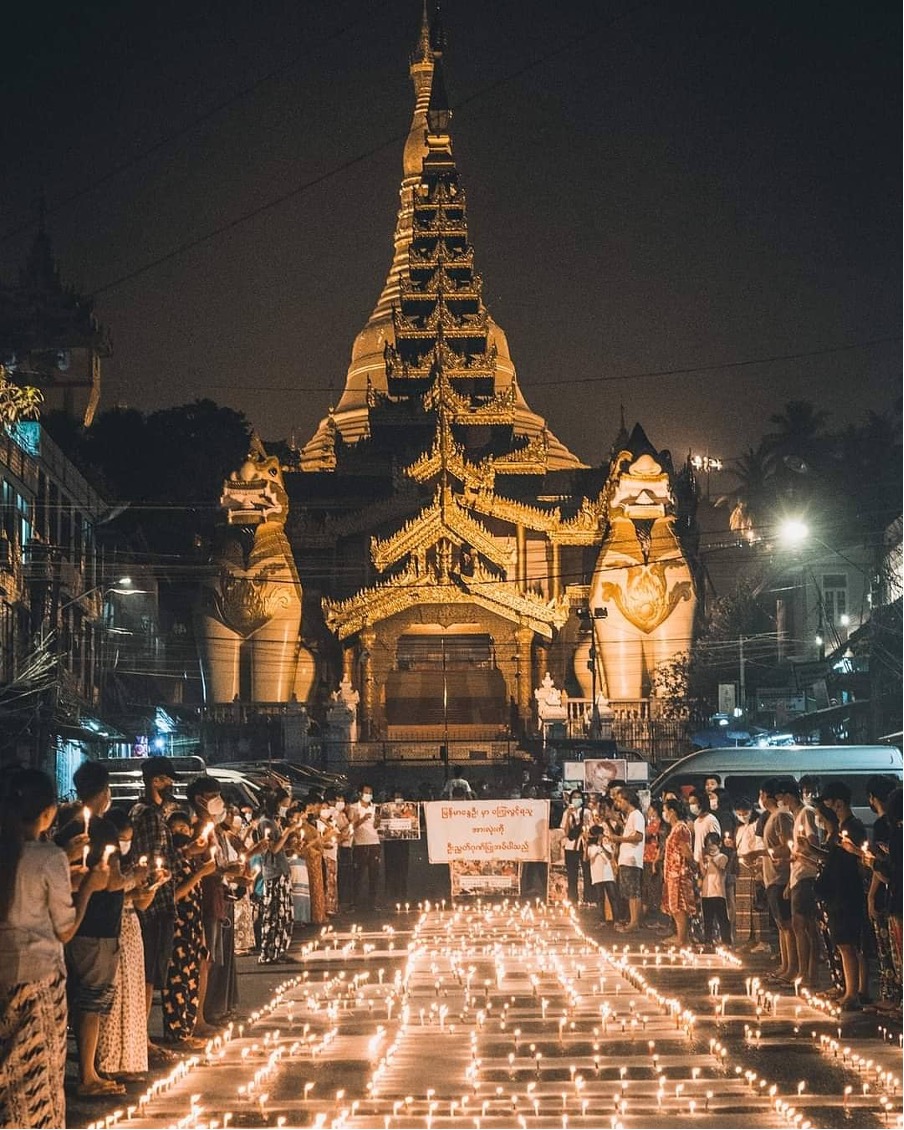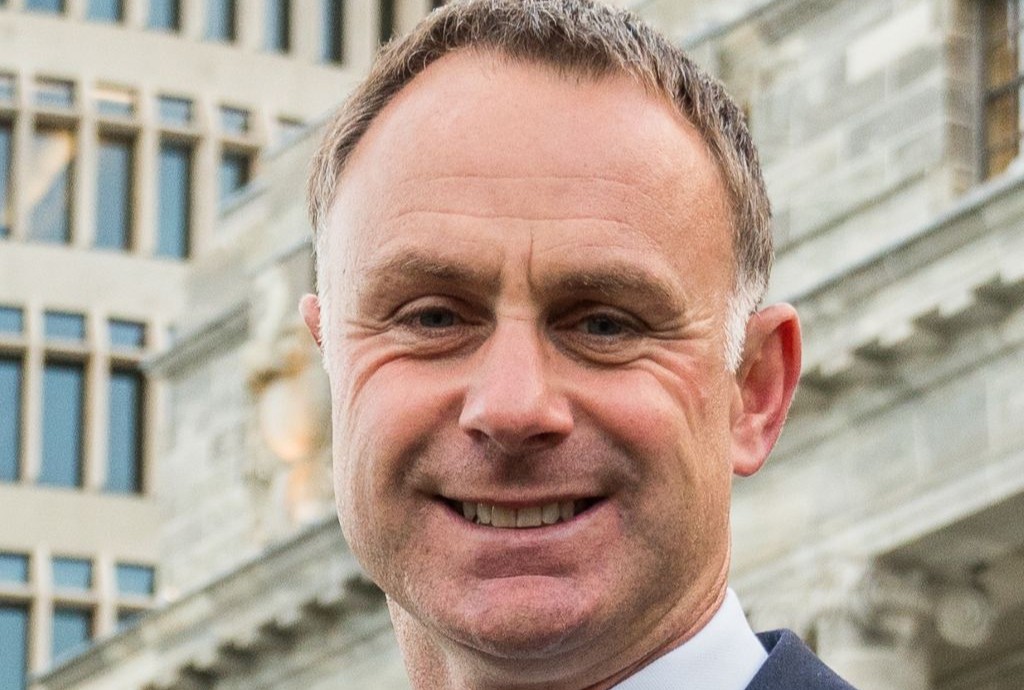Table of Contents
26th February 2021
There was nothing much happening in Myanmar today, so I will, as promised, start off with my quote from two days ago. “Lots of people in Myanmar upset with the Military and some were injured.”
The reason nothing happened today is that communications are getting more difficult and so it is harder to find out what is actually going on.
The Myanmar representative to the United Nations Kyaw Moe Tun, made a statement to the UN Body today. He denounced the coup and said that he was the representative of a democratic government.
He saluted the assembly and then gave a few words in Burmese.

He appealed to the World Body to “use any means necessary” against the Military to provide safety and security for the people. He finished with a few words in Burmese, including “people are priority, revolution must succeed”. The revolution referred to is the CDM movement.
Daw Aung San Suu Kyi has been moved from her Nay Pyi Taw home to a secret location. The NLD don’t know where she is being kept.
A touching prayer vigil was held in front of the Shwe Dagon Pagoda. It’s a visually stunning image and will be seen around the world, unless it’s not newsworthy or bloody enough.

One of the reasons things are quiet is that journalists are keeping a low profile as the Military are now targeting them. One of the best, the award-winning Mratt Kyaw Thu, of Frontier magazine Yangon is very quiet today and is keeping a low profile. The civil servants however aren’t keeping a low profile. They just aren’t turning up to work, and the economy and operation of the State are grinding to a halt.
Public hospitals are deserted. Government offices left dark. And the trains don’t leave the stations.
Despite risks to their lives and livelihoods, many Myanmar civil servants are refusing to work for the junta, as a growing civil disobedience movement seeks to thwart the generals by paralysing the bureaucracy.
“The military needs to prove that they can manage the country well as a government. But if we… the civil servants don’t work, their plan to take power will fail,” Thida, a public university lecturer who asked to use a pseudonym, told AFP on Monday (Feb 22) as cities were brought to a standstill by the largest strike yet.
In the three weeks since the coup, Thida has refused to teach her online classes. She joined the nationwide walkouts kicked off by medical workers, many of whom are now in hiding to evade arrest.
From the capital to seaside ports, work stoppages in the private sector have hollowed out offices and factories and forced many bank branches shut.
But it is the civil servants’ swelling ranks within the resistance that has the junta particularly rattled.
Without them, it is unable to collect taxes, send out electricity bills, test the population for Covid-19 or simply keep the country running.
The spectre of a financial crisis — already brewing because of the pandemic downturn and a decline in foreign investment — looms large.
It remains unclear how many of the roughly one million public sector workers are participating.
One crowd-sourced survey found members of all 24 government ministries are now involved, while the UN special rapporteur on Myanmar has estimated three-quarters of the civil servants are on strike.
Their absence is beginning to bite.
Nearly one-third of the nation’s hospitals are no longer functioning, coup leader Min Aung Hlaing said this week.
Decrying medical professionals’ failure to fulfil their duties, he hinted that working doctors and teachers would soon receive cash rewards, according to remarks reported by state media on Tuesday.
One doctor told AFP that staff shortages meant his hospital has had to turn away new patients.
Medical “cover teams” have formed to provide emergency treatment to protesters under fire from rubber bullets and live ammunition.
(If you can’t beat them into submission then try bribery)
Paper pushing in government departments has all but halted, according to local media reports, and around the country clerks, drivers and administrators have been dismissed over their absence.
“The military didn’t anticipate that a large part of the civil service would walk out and leave them without a state apparatus,” said an analyst who asked to remain anonymous as the junta has detained more than 700 of its critics.
“The impact of the movement doesn’t necessarily depend on all of the bureaucracy participating, but on key parts paralysing the military’s ability to collect revenue and distribute it across the state machinery.”
The extent of this incapacitation could become clearer on Friday, when Myanmar’s State Administration Council — as the coup leaders have dubbed themselves — confronts payday for the entire public sector.
The Myanmar Economic Bank (MEB), which distributes government salaries and pensions, has been hobbled by walkouts, but state media said it was a “baseless rumour” that compensation would not be forthcoming.
In a sign of the generals’ growing uneasiness, official media outlets have printed near-daily summonses for civil servants to return or face legal action, while overnight arrests have targeted civil disobedience movement participants.
Min Ko Naing, a leader of the 1988 pro-democracy uprising, urged government workers to continue their strike, saying on Facebook that it was the most important factor in the bid to bring down the regime. Groups have sprung up to assist public employees with food and housing, while members of the ousted civilian government have pledged to compensate lost wages should they reclaim power, fuelling the hopes of workers like Thida.
Source The Star, Malaysia 26th February.
This is what will be the downfall of the Military, or the downfall of the Nation.
Please share this article so that others can discover The BFD









